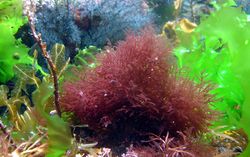Pollution and algae
Algae are often unicellular (e.g. diatoms), as such they are constantly in direct contact with their environment to acquire the nutrients necessary to grow, and perform photosynthesis. While acquiring these nutrients, pollutants such as heavy metals or organochlorine compounds may enter the cell as well, and accumulate there.[1] If they accumulate above certain threshold concentrations, heavy metals can depress algal growth. They can also destabilize their cell membrane, which inhibits cell division or causes the algae to change shape. [2]
Organochlorine compounds can inhibit photosynthesis and algae cell growth. However, there seems to be a wide range in the tolerance of algae towards these compounds. Some species are affected at lower concentrations than other algae species. Therefore these compounds might influence the algae community structure, and thus threaten the algae biodiversity and their seasonal cycles. [3]
Below you can find some links to Belgian case studies on ecotoxicology in algae.
Case studies
Case study 1:PCBs and organochlorine pesticides in Antarctic algae[4]
References
- ↑ Elliot, M.; Hemingway, K. (2002). Fishes in estuaries. Blackwell Science: London, UK. 636 pp.
- ↑ Md. Shahidul Islam and Masaru Tanaka, 2004, Impacts of pollution on coastal and marine ecosystems including coastal and marine fisheries and approach for management: a review and synthesis, Marine Pollution Bulletin Volume 48, 7-8 Pages 624-649.
- ↑ https://kb.osu.edu/dspace/bitstream/1811/5666/1/V72N01_006.pdf
- ↑ Joiris, C.R.; Overloop, W. (1991). PCBs and organochlorine pesticides in phytoplankton and zooplankton in the Indian sector of the Southern ocean. Antarctic Science 3: 371-377
Please note that others may also have edited the contents of this article.
|
